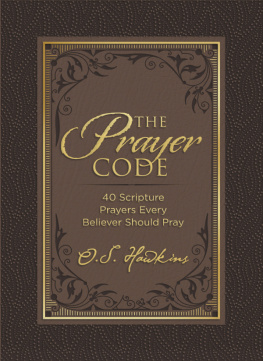P RAYER
A S HAW B OOK
P UBLISHED B Y W ATER B ROOK P RESS
2375 Telstar Drive, Suite 160
Colorado Springs, CO 80920
A division of Random House, Inc.
Unless otherwise indicated, all Scripture quotations are taken from the Holy Bible: New International VersionNIV Copyright 1973, 1978, 1984 by International Bible Society. Used by permission of Zondervan Publishing House. All rights reserved.
ISBN: 0-87788-709-8
eBook ISBN: 978-0-307-83071-5
Copyright 1993 by Timothy Jones and Jill Zook-Jones
All rights reserved. No part of this book may be reproduced or transmitted in any form or by any means, electronic or mechanical, including photocopying, recording, or any information storage and retrieval system without written permission from the publisher.
SHAW and its circle of books logo are trademarks of WaterBrook Press, a division of Random House, Inc.
v3.1

CONTENTS
2 How Shall We Come?
Luke 18:9-14; Hebrews 4:14-16
3 Great Is the Lord!
Psalm 145; 1 Thessalonians 5:16-18
4 A Cry for Forgiveness
1 John 1:8-10; Psalm 51
5 Dont Be Afraid to Ask
James 5:13-18; Luke 11:9-13
6 Prayers for the Kingdom
Ephesians 6:18-20; 1 Timothy 2:1-7
7 Praying That Just Wont Quit
Luke 11:5-8; 18:1-8
8 A Listening Heart
John 10:1-5; 1 Samuel 3:1-21
9 Two Are Better Than One
Matthew 18:19-20; Hebrews 10:23-25
10 When the Door Wont Open
Psalm 13; 2 Corinthians 12:7-10
11 The Arsenal of Prayer
Ephesians 6:10-18
12 When Words Fail Us
1 Corinthians 2:6-16; Romans 8:26-27

INTRODUCTION
Few areas of the Christian life inspire more resolutionsor create more guiltthan prayer. I know I should pray, and I want to, a friend of ours confesses, but its a struggle.
Many of us grapple with not knowing how to pray. We long to address God but arent sure what to say. We want to speak freely, but our prayers fall into stale routines or well-rutted patterns.
We share the longing expressed by one of Jesus disciples when he exclaimed, Lord, teach us to pray (Luke 11:1). Although the disciples had known years of praying, they sensed something different about the way Jesus talked with the Father. They saw a depth and reality in his relationship with God that made them uncomfortable with their dry devotional times and restless for something more. Jesus was happy to show them a better way; his pattern for prayer has become one of the most loved passages of the New Testament.
Scripture is filled with guidance for praying. Its many-splendored teachings and model prayers can enrich your times with God. They can turn your empty resolutions into times of intimacy and fruitfulness. As you begin this study, let your prayer be that of the disciple who came to Jesus, anxious to learn. And let your heart be open to Gods Word, for he is eager to teach you to pray.

HOW TO USE THIS STUDYGUIDE
Fisherman studyguides are based on the inductive approach to Bible study. Inductive study is discovery study; we discover what the Bible says as we ask questions about its content and search for answers. This is quite different from the process in which a teacher tells a group about the Bible and what it means and what to do about it. In inductive study God speaks directly to each of us through his Word.
A group functions best when a leader keeps the discussion on target, but this leader is neither the teacher nor the answer person. A leaders responsibility is to asknot tell. The answers come from the text itself as group members examine, discuss, and think together about the passage.
There are four kinds of questions in each study. The first is an approach question. Used before the Bible passage is read, this question breaks the ice and helps you focus on the topic of the Bible study. It begins to reveal where thoughts and feelings need to be transformed by Scripture.
Some of the earlier questions in each study are observation questions designed to help you find out basic factswho, what, where, when, and how.
When you know what the Bible says you need to ask, What does it mean? These interpretation questions help you to discover the writers basic message.
Application questions ask, What does it mean to me? They challenge you to live out the Scriptures life-transforming message.
Fisherman studyguides provide spaces between questions for jotting down responses and related questions you would like to raise in the group. Each group member should have a copy of the studyguide and may take a turn in leading the group.
For consistency, Fisherman guides are written from the New International Version. But a group should feel free to use the NIV or any other accurate, modern translation of the Bible such as the New Living Translation, the New Revised Standard Version, the New Jerusalem Bible, or the Good News Bible. (Other paraphrases of the Bible may be referred to when additional help is needed.) Bible commentaries should not be brought to a Bible study because they tend to dampen discussion and keep people from thinking for themselves.
SUGGESTIONS FOR GROUP LEADERS
Read and study the Bible passage thoroughly beforehand, grasping its themes and applying its teachings for yourself. Pray that the Holy Spirit will guide you into truth so that your leadership will guide others.
If the studyguides questions ever seem ambiguous or unnatural to you, rephrase them, feeling free to add others that seem necessary to bring out the meaning of a verse.
Begin (and end) the study promptly. Start by asking someone to pray for Gods help. Remember, the Holy Spirit is the teacher, not you!
Ask for volunteers to read the passages out loud.
As you ask the studyguides questions in sequence, encourage everyone to participate in the discussion. If some are silent, ask, What do you think, Heather? or, Dan, what can you add to that answer? or suggest, Lets have an answer from someone who hasnt spoken up yet.
If a question comes up that you cant answer, dont be afraid to admit that youre baffled! Assign the topic as a research project for someone to report on next week.
Keep the discussion moving and focused. Though tangents will inevitably be introduced, you can bring the discussion back to the topic at hand. Learn to pace the discussion so that you finish a study each session you meet.
Dont be afraid of silences: some questions take time to answer and some people need time to gather courage to speak. If silence persists, rephrase your question, but resist the temptation to answer it yourself.

















